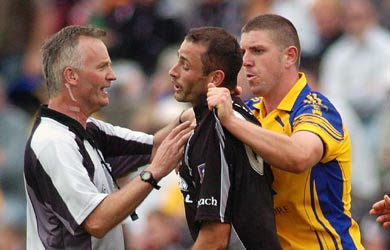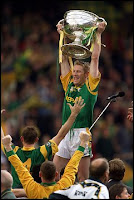 |
| 1996. Peter Canavan is reminded of his place. |
Bill Simmons of ESPN remarked in the run-up to this year’s Super Bowl that the US media is considerably behind the general public in its coverage of steroids in American football. In the same way, the GAA media does not always cover what people are talking about in regard to Gaelic games.
There are rows in camps that are never reported on but are discussed among GAA people in every bar and at every crossroads in Ireland. There are peculiar funding issues that the media do not touch with a ten-foot-pole but that, again, are very much the lingua franca of common GAA debate.
And then there is the question of what’s on and what’s not. This is one of the reasons why we’re still talking about Joe Brolly disgracing himself three weeks later. There have always been teams that, ahem, play on the edge in the GAA. It’s just that they are not discussed in the media, other than in code. Such-and-such a team play on the edge. They’re hard, but fair. Theirs is a robust brand of football.
And these codes cover a multitude of sins. The problem as regards journalism is that once someone breaks cover as Brolly did, and accuses one team of being dirtier than any other team in Ireland, the language doesn’t exist to discuss the accusation properly.
For over one hundred years teams and players have been given the benefit of the doubt, and then anointed in retirement, as the sepia tint of history and nostalgia washes out the blood and bruises of the opposition. As such, people are very unsure of their ground as regards Tyrone’s particular style of play.
Which is a pity. It’s a pity in terms of journalism, because the games are one of the few things that have been an unqualified success in Ireland since the Civil War. They should be correctly recorded, so that future generations may understand. And it’s also a pity because Tyrone, three-time All-Ireland Champions and still in with a chance of four, are being given a bad name that those good football people do not deserve.
“Dirty” play, in GAA terms, is hard to define. Striking – that is to say, punching someone – is considered a worse offence than spitting, in sporting and in civil law. But in sporting culture, spitting is by far the worse offence.
If you punch someone, there’s an above average chance that someone will punch back, and the best puncher will win the day. Spitting doesn’t work like that. Spitting back doesn’t even the score, so all the spat-upon can do is punch the spitter. This will get the spat-upon sent off, and the spitter wins hands-down.
That’s just one example. There are many, many more examples, at different levels of nefariousness. The GAA rules as written are different to the GAA rules as refereed, because so many decisions are at the discretion of the referee. And that is the root cause of the issue.
Ger Loughnane remarks in his autobiography that he repeatedly told his great Clare team of the ‘90s that the referee would not protect them. They had to protect themselves. This is a fundamental truth of the GAA, and one that Tyrone have learned the hard way.
Look at the history of Tyrone football. Tyrone won their first Ulster title in 1956, when they were the first new county to win Ulster since 1900. Tyrone won only four more Ulster titles before beating Galway in an All-Ireland semi-final and were then unlucky to lose to Kerry after being seven points up in the 1986 Final.
Ten years later, Tyrone were back in the All-Ireland final. They lost to Dublin after a free was awarded to Dublin in the dying seconds. A visibly distraught Tyrone manager, Art McRory, was interviewed coming off the pitch. “I knew Dublin needed to win an All-Ireland,” he said, “but I didn’t know they needed it that badly.”
McRory apologised for his unsporting remarks almost immediately, but all he did was vocalise what a lot of people watching thought. The following year, Tyrone retained their Ulster Championship but lost the All-Ireland semi-final to Meath.
Tyrone were mugged in that semi-final. Peter Canavan carried Tyrone on his back in the mid-nineties. Meath sandwiched him while he was still in the air after kicking a point and that was that danger taken care of for the rest of the game. Two other Tyrone players had their heads stood on.
Meath went on to win the All-Ireland in 1996, and again in 1999. One of the men who sandwiched Canavan is considered, along with Anthony Tohill, the greatest midfielder of the 90s. One of the men who stood on a Tyrone head is on the GAA Team of the Millennium.
The referee will not protect you, said Loughnane. You have to protect yourself.
Liam Hayes wrote about Meath’s robust style of play in his memoir, Out of Our Skins. He admitted that Meath were dirty, and did no small amount of chirping during a game.
There is one remarkable passage in which he describes how Meath made a point of mentally breaking a new Dublin midfielder on his debut, for fear he might develop into a player down the line. A solution worthy of King Herod himself.
Hayes also wrote that Meath developed that tough style because they were tired of being pushed around by the great Dublin team of the 1970s, a team that included a number of notoriously dangerous characters. And Dublin got tough, they say, to go toe-to-toe with the great Meath team of the 1960s. And so on into the past it goes.
If there’s a problem with Gaelic football the problem is in the rules, not in the men. Tyrone are no better or no worse than average and are not doing what so many teams have done before them. You can only dance with the girls in the hall. If the girls in this particular hall can crack their knuckles and drink pints in one swallow, you have to match them or go dance somewhere else. The referee will not protect you. You have to protect yourself.











